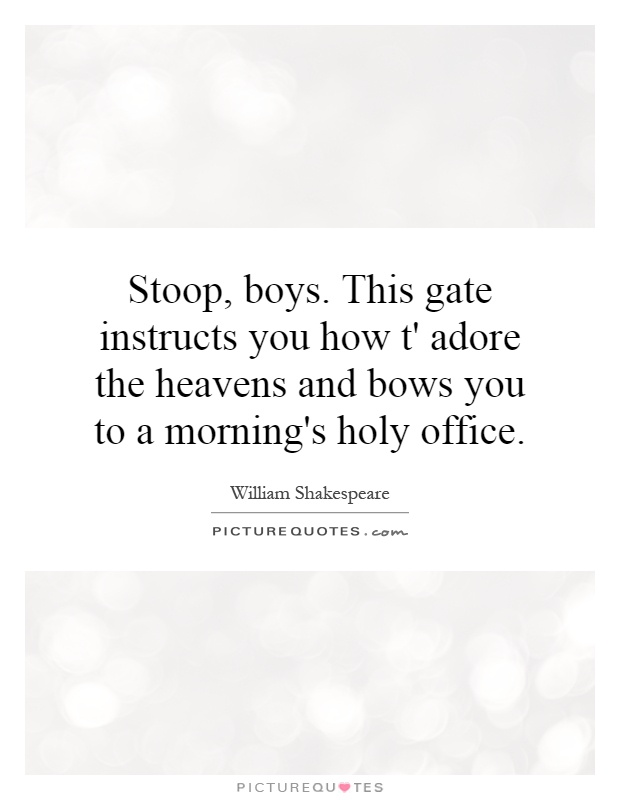Stoop, boys. This gate instructs you how t' adore the heavens and bows you to a morning's holy office

Stoop, boys. This gate instructs you how t' adore the heavens and bows you to a morning's holy office
In the context of William Shakespeare, the quote "Stoop, boys. This gate instructs you how t' adore the heavens and bows you to a morning's holy office" can be interpreted as a call to humility and reverence towards the divine. Shakespeare often explored themes of religion, spirituality, and the supernatural in his works, and this quote reflects his deep understanding of the human connection to the heavens.The phrase "Stoop, boys" can be seen as a command to lower oneself in a gesture of respect and submission. This act of stooping or bowing is a physical manifestation of humility and reverence, a way of acknowledging the greatness and majesty of the heavens above. By instructing the boys to bow, the speaker is reminding them of their place in the grand scheme of things, urging them to recognize the power and beauty of the celestial realm.
The mention of a "gate" in the quote suggests a threshold or boundary between the earthly and the divine. Gates are often symbolic of transitions or passages, and in this context, the gate serves as a portal to the heavens, a gateway to a higher realm of existence. By instructing the boys on how to adore the heavens, the speaker is guiding them towards a deeper understanding of the spiritual world and encouraging them to engage in a morning's holy office, a sacred ritual or act of worship.
The phrase "holy office" carries connotations of religious duty or service, suggesting that the act of adoring the heavens is a form of devotion or reverence. In Shakespeare's time, religion played a central role in people's lives, and the idea of performing a holy office would have been a familiar concept to his audience. By linking the act of adoration to a morning ritual, the speaker emphasizes the importance of starting the day with a sense of awe and reverence for the divine.
Overall, this quote from Shakespeare serves as a reminder of the importance of humility, reverence, and devotion in our relationship with the heavens. It encourages us to bow before the majesty of the celestial realm and to engage in acts of worship and adoration as a way of connecting with the divine.












 Friendship Quotes
Friendship Quotes Love Quotes
Love Quotes Life Quotes
Life Quotes Funny Quotes
Funny Quotes Motivational Quotes
Motivational Quotes Inspirational Quotes
Inspirational Quotes